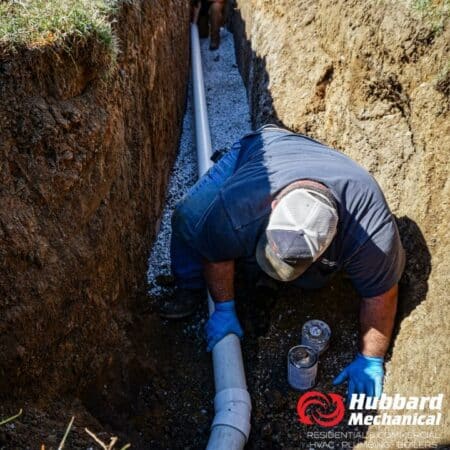
Hubbard mechanical – Lexington KY – 859-340-4446 – Plumbers in Lexington KY
As the winter season approaches, it’s essential to prepare your home’s plumbing system to withstand the challenges posed by freezing temperatures. Plumbers Lexington KY, understand the unique demands of the local climate and have compiled a comprehensive list of winterization tips to help you and your customers safeguard their plumbing. Follow these expert recommendations to prevent costly damage and ensure a smoothly functioning plumbing system throughout the winter months.
Insulate Exposed Pipes:
- One of the primary concerns during winter is the potential for pipes to freeze and burst. To mitigate this risk, advise your customers to insulate exposed pipes, especially those in unheated areas like basements, attics, and crawl spaces. Use pipe insulation sleeves or wrapping to provide an extra layer of protection against the cold.
Seal Leaks and Cracks:
- Cold air infiltration can lead to freezing pipes, so it’s crucial to seal any leaks or cracks in the home’s exterior. Inspect windows, doors, and foundations for gaps, and use weatherstripping or caulking to seal them. This not only helps in conserving energy but also protects the plumbing from freezing temperatures.
Disconnect and Drain Outdoor Hoses:
- Before the winter chill sets in, remind your customers to disconnect and drain outdoor hoses. Water left in hoses can freeze, causing damage to both the hose and the connected faucet. Additionally, shut off the outdoor water supply, if possible, to prevent freezing in outdoor pipes.
Service the Water Heater:
- A properly functioning water heater is essential for maintaining comfortable living conditions during the winter. Encourage your customers to drain and flush their water heaters to remove sediment buildup, which can affect efficiency. Check the water heater’s thermostat setting to ensure it’s at an optimal temperature for winter usage.
Locate and Shut Off the Main Water Valve:
- In the event of a plumbing emergency or if your customers plan to be away for an extended period, it’s crucial to know how to shut off the main water supply. Show them the location of the main water valve and provide instructions on how to turn it off. This step can prevent extensive water damage in case of a burst pipe.
Keep Interior Spaces Warm:
- Maintaining a consistent indoor temperature, even when the house is unoccupied, helps prevent pipes from freezing. Advise your customers to set their thermostats to a reasonable temperature, and recommend using additional heating sources, like space heaters, in vulnerable areas.
Frequently Asked Questions:
- How do you take care of pipes in the winter?
Wrap pipes with heat tape or thermostatically controlled heat cables. Be sure to follow all manufacturers’ installation and operation instructions. Seal leaks that allow cold air inside, near where pipes are located (i.e. around electrical wiring, dryer vents, other pipes), with caulk or insulation. - Is it better to drain your pipes in the winter?
Turning off the main water supply to your house and draining the pipes can help prevent them from freezing, especially in very cold temperatures. By removing the water from the pipes, you reduce the risk of the water freezing and causing the pipes to burst. - How do you prevent pipe burst in winter?
Opening up the cabinets under your sink and putting a space heater nearby – or even using your hair dryer on the pipes underneath – can help in some cases. “Make sure and clean the cabinet completely out, nothing under there that can be flammable, and keep it at least two feet away from any combustibles,” he said.
Conclusion:
Winterizing a home’s plumbing is a proactive approach to prevent potential issues and costly repairs. By following these expert tips from Plumbers Lexington KY, you and your customers can ensure a well-protected plumbing system that withstands the challenges of winter. Regular maintenance and preparation will go a long way in preserving the integrity of the plumbing and providing peace of mind during the colder months. Expert plumbers in Lexington, KY recommend a few key tips to safeguard your plumbing during winter. First, insulate exposed pipes to prevent freezing and potential bursts. Second, ensure proper sealing of windows and doors to prevent cold drafts that can affect pipe temperatures. Third, keep a consistent indoor temperature to maintain warmth throughout the home. Finally, schedule a professional plumbing inspection before winter sets in to address any potential issues before they escalate. By following these tips, homeowners can minimize the risk of winter-related plumbing problems and ensure a smoothly functioning system throughout the colder months.


Recent Comments